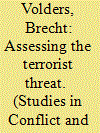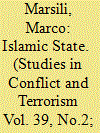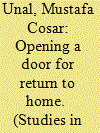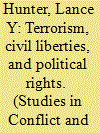|
|
|
Sort Order |
|
|
|
Items / Page
|
|
|
|
|
|
|
| Srl | Item |
| 1 |
ID:
144867


|
|
|
|
|
| Summary/Abstract |
Each terrorist organization faces a critical tradeoff between effectively managing the organization's violent behavior while remaining secure from counterterrorism efforts. Drawing on organization theory and terrorism literature, this article develops theoretical linkages between the organizational design of a terrorist group and this critical tradeoff. It considers the impact of four key design parameters: membership, operational space and time, formalization, and centralization. The first two structural parameters construct the physical anatomy of a terrorist organization. The latter two structuring parameters prescribe or restrict the behavior within this organizational context. Net advantages by means of rising structural design parameter values are increasingly offset by the organizational strength and security vulnerabilities that inherently follow from the rising structuring parameters.
|
|
|
|
|
|
|
|
|
|
|
|
|
|
|
|
| 2 |
ID:
144866


|
|
|
|
|
| Summary/Abstract |
This study analyzes the political reasons that allowed the Islamic State to expand successfully in Syria and Iraq, by enabling to “franchise” worldwide, and the role of the regional governments in this issue. The article provides a different explanation from the classic approach of the “clash of civilizations” theorized by Samuel P. Huntington, ascribing responsibility for the growth and expansion of the Islamic State to the complex framework of geopolitical alliances within the Muslim civilization and the Arab world. The article highlights the attempt by Turkey to establish itself as a regional power and guidance of the Islamic world, by resurrecting the Caliphate, and, based on this, explains the contrast with the Islamic State, whose goal is the foundation of a globalized Caliphate. The plans of the Turkish President Erdoğan for a Great Turkey, allied with Egypt, have foundered with the coup that ousted the Muslim Brotherhood from power. The study relates the connection of Ankara with the Kurds, regarding the management of the crisis in Syria and Iraq, and the Turkish liaison with regional powers (Iran, Egypt, Saudi Arabia, and Israel) and other powers (Russia, China, and the United States).
|
|
|
|
|
|
|
|
|
|
|
|
|
|
|
|
| 3 |
ID:
144868


|
|
|
|
|
| Summary/Abstract |
This study analyzes the impact of the Turkish Repentance Laws in undermining the Kurdistan Workers Party (PKK). Did the repentance laws increase the PKK surrender, thereby decreasing the PKK violence? Vector Auto-Regression analysis indicates that enactment of repentance laws did not have any significant impact on PKK surrenders, failing to significantly decrease PKK violence. Yet it does not establish any meaningful relationship between the use of force and PKK surrenders. Descriptive analyses show the significant number of surrenders took place in 1993–94, 2001, and 2003, while the highest number of penitents submitted to the “Return to Home Law” in 2003. These values relate to a specific context. This study, however, asserts that surrendered and applicant PKK members were too few to influence the overall conflict, concluding that, in addition to what these laws mean to the penitents, the success/failure of repentance policies are related to the nature of Turkey's counterinsurgency and their respective context.
|
|
|
|
|
|
|
|
|
|
|
|
|
|
|
|
| 4 |
ID:
144869


|
|
|
|
|
| Summary/Abstract |
This article examines the effect terrorism has on civil liberties and political rights across a wide range of democracies and regions. This study includes an analysis of the influence domestic and international terrorist attacks have on civil liberties and political rights in 48 democratic states from 1971–2007. The results from a time series cross-national analysis reveal that terrorism weakens civil liberties and political rights. However, certain types of democracies are more affected by terrorism than others. These findings have important implications for democracy and counterterrorism strategies in democratic states.
|
|
|
|
|
|
|
|
|
|
|
|
|
|
|
|
|
|
|
|
|